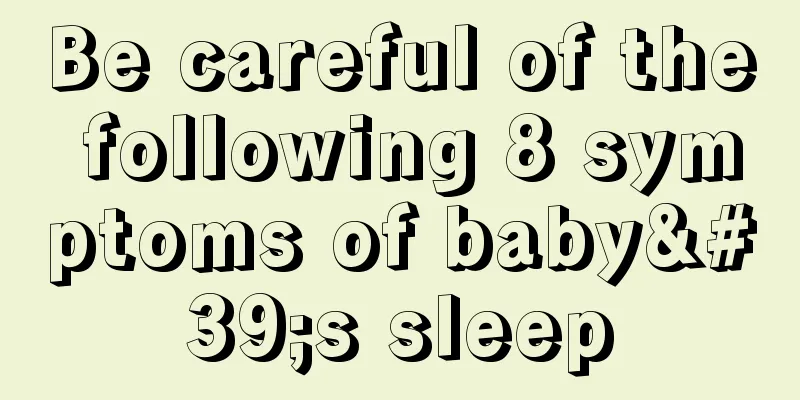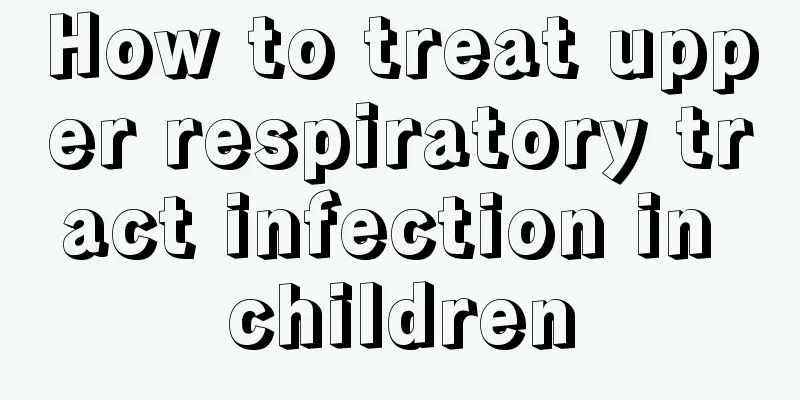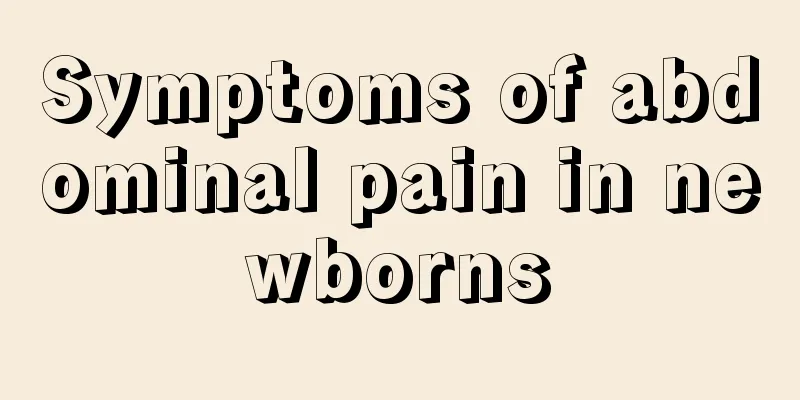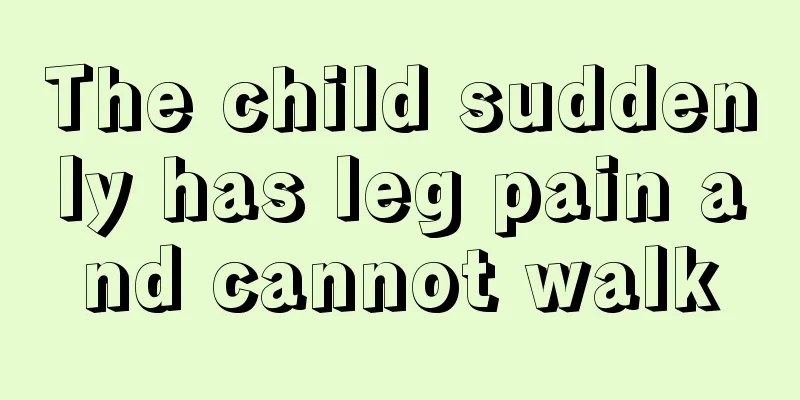Be careful of the following 8 symptoms of baby's sleep

|
Normal babies are relatively quiet and comfortable when they sleep, their breathing is even and without any sound, and sometimes some interesting expressions appear on their little faces. However, if the baby has the following conditions, parents should pay great attention to it. Symptom 1: The baby sweats profusely when just falling asleep or about to wake up Expert reminder: It can be said that it is normal for most babies to sweat at night. However, if you are sweating profusely and have other symptoms of discomfort, you should pay close attention, strengthen care, and go to the hospital for examination and treatment if necessary. For example, if a baby has a square head, late teething, or late closure of the fontanelle, he or she may be suffering from rickets. Symptom 2: The baby is irritable before going to bed at night, and after falling asleep, the whole body is dry, the cheeks are red, the breathing is rapid, and the pulse is accelerated to more than 110 beats/minute Experts warn: This indicates that the baby is about to have a fever. You should pay attention to whether your baby has cold symptoms or diarrhea symptoms, and also make sure to keep him hydrated. If the baby really has symptoms of fever, physical cooling methods such as alcohol wiping should be adopted. Symptom 3: The baby cries while sleeping, often shakes his head, scratches his ears, and sometimes has a fever Experts warn: The baby may be suffering from otitis externa, eczema or otitis media. You should check the baby's ear canal for redness or swelling, and whether there are red spots on the skin. If so, send the baby to the hospital for diagnosis and treatment in time. Symptom 4: The baby's limbs shake while sleeping Experts remind: This is generally caused by excessive fatigue during the day, so there is no need to worry. It should be noted that it is a normal reaction for a baby to tremble when hearing a loud noise while sleeping. On the contrary, if there is no reaction and he likes to sleep on weekdays, be careful that he may be deaf. Symptom 5: The baby keeps chewing after sleeping Experts warn: The baby may have ascariasis, or may have eaten too much during the day and have indigestion. You can go to the hospital for a check-up. If it is ascariasis, you can use special anthelmintics for babies to eliminate it. If ascariasis is ruled out, you should arrange the baby's diet reasonably. Symptom 6: The baby's fingers or toes twitch and swell after falling asleep Experts remind: At this time, parents should carefully check the baby's fingers to see if they are entangled with hair or other fibers, or if there are signs of mosquito bites. Symptom 7: The baby cannot sleep soundly and often turns over. Experts remind: In fact, it is quite common for babies to roll over in bed after falling asleep. Sometimes an uncomfortable quilt or a quilt that is too thick will affect the baby's sleep quality. Some parents are afraid that their children will feel cold when they sleep, so they let them sleep with their clothes on. The children feel uncomfortable and roll around. Some parents are always worried that their children do not eat enough, so they let them eat a lot before going to bed at night. As a result, the children's stomachs always feel bloated and uncomfortable after going to bed, so they cannot sleep well. Symptom 8: Babies often cry loudly after falling asleep Experts remind: This is medically known as infant night terrors. If the child is not sick, it is usually caused by adverse stimulation during the day, such as fright, fatigue, etc. So don't scare your children and keep them calm and happy. In short, babies are still in a period where they cannot express their likes and dislikes. In addition to arranging enough sleep time for them, parents should observe their abnormal changes while they are sleeping to prevent delays in the disease. Babies aged 8 to 9 months usually sleep 2 to 3 times during the day, lasting 2 to 6 hours, and sleep 10 hours at night, for a total of 14 to 15 hours. Too little sleep will affect the baby's physical development; too much sleep will affect the activity time and delay the baby's intellectual development. Oh, being a parent is not an easy thing! |
<<: Three ways to make it easier to put your baby to sleep
>>: 5 ways to develop your child's financial intelligence
Recommend
What to do if your baby has not had a bowel movement for a week
Families with babies are very concerned about the...
What are the benefits of outdoor activities in kindergarten?
When the baby reaches a certain stage of growth, ...
What to do if your baby has green stools for a long time
The health of the baby is very important. Childre...
What should I do if my baby has a hoarse throat?
Sometimes babies can easily develop hoarse throat...
What medicine is better for children with itchy throat and cough?
Children's health is a matter of great concer...
Frequent urination in children
Frequent urination is very common. Many people ur...
What is the cause of the child's stomach rumbling and vomiting?
For children, the stomach and intestines are rela...
Causes of vaginitis in children
In the eyes of many people, vaginitis only occurs...
What causes brain tumors in children?
According to experts' investigation, the numb...
What causes leg cramps in children?
Children will always encounter problems of varyin...
What to do if your child has red spots on his lips
The healthy growth of children is of concern to e...
What are the treatment, diagnosis and prevention of albinism in children?
Children nowadays are so happy. Their parents nev...
6 tips to help you raise a child with money
After having children, many mothers cut down on t...
Which part should be massaged when a child has a cough?
In places where children gather, we often see som...
What should children eat if they have excessive dampness in their bodies?
To address the problem of excessive moisture in t...









